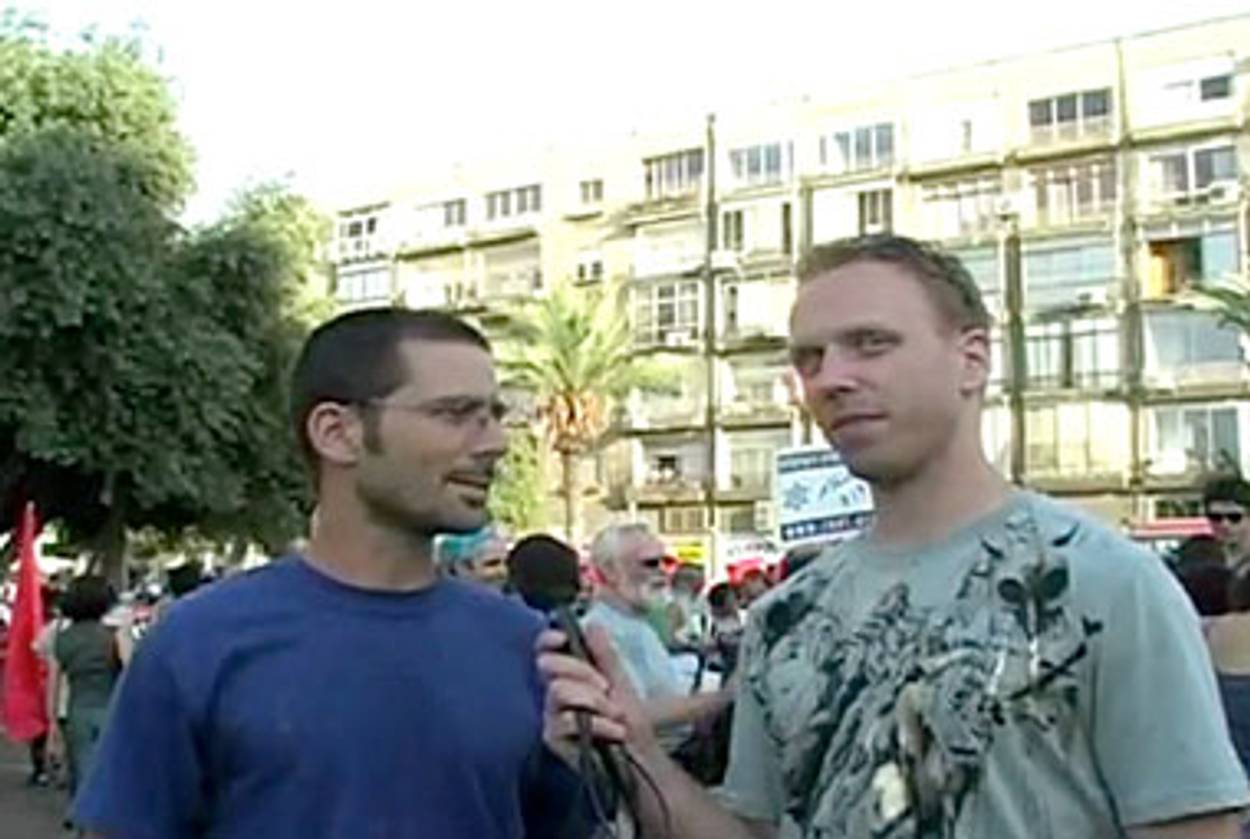Video Guerrilla
Max Blumenthal’s rise as the left’s YouTube documentarian




Last month, as the White House was engaged in orchestrating a carefully choreographed diplomatic dance on the subject of Israeli settlements, rumors surfaced on the Washington blogs that Hillary Clinton was thinking of bringing Sidney Blumenthal, a steadfast Clinton loyalist, to the State Department as a speechwriting consultant. But this week, as Clinton delivered her first major policy address at the Council on Foreign Relations, The New York Times reported that Blumenthal was among several Clinton friends whose appointments had been scuttled by the Obama administration.
Blumenthal—a lightning-rod figure whose Republican enemies still call him by the nickname Sid Vicious—was never bound to be an easy sell to the drama-averse Obama crowd, but these days he comes with a new potential liability: his son, Max, a 31-year-old journalist who has carved out a role for himself as a kind of YouTube Michael Moore, infiltrating conservative conventions to capture confrontations with the likes of Ann Coulter and Michelle Malkin. But recently, he turned his attention to a new target.
“The whole time I was writing about the right, I was following the Israeli-Palestinian conflict closely,” Max Blumenthal said in an interview with Tablet this week. “But I wanted to establish a modicum of credibility before I pulled the trigger.”
In early June, the day before Obama’s landmark address to the Muslim world from a Cairo stage, Blumenthal went into central Jerusalem armed with a shotgun mike and a cameraman to interview college-aged—and very likely drunk—Americans, who, with remarkably little prompting, spewed racist vitriol about the president while asserting a strikingly meatheaded brand of Jewish pride. The video went viral, garnering more than 400,000 views before YouTube pulled it down, citing unspecified terms-of-use violations.
Blumenthal comes across as an insider’s outsider; he veers from earnest, serious condemnations of the Israeli left or Sacha Baron Cohen’s portrayal of Kazakhs to cracks about Shabak interrogations, and frets about being passed over in “hot or not” discussions among interns at The Nation. He describes himself as a “non-Zionist” liberal, though he describes the identification of anti-Zionism with anti-Semitism as a “cynical ploy by the Israel lobby.”
He said he was less surprised by what the subjects said than by the reaction after the video posted, on June 5. Commentators from across the political spectrum went nuts; those on the left objected to letting hate speech against the president go unchecked, but the most vocal criticism, which Blumenthal claims included death threats, came from those who felt it was wrong to portray Jews in such a negative light, either for fear of fomenting anti-Semitism or because of the implicit moral equivalence with everyone from garden-variety America-haters to actual anti-Israel terrorists.
Blumenthal said he didn’t think that concern was sufficient to merit quashing the video, which he said he’d hoped would prompt “soul-searching” in the American Jewish community and become a teaching tool for people engaging with the Israeli-Palestinian conflict.
“It may not reflect the reality, but they reflect a reality,” Blumenthal said, dismissing the concern that the video might be “bad for the Jews.” “So why not show it?”
This impulse, he said, came from his father’s advice on being a journalist. “He urges me to be cautious in my methodology and how I express myself, and to be clinical in my writing—to not be strident, to let the facts speak for themselves,” Blumenthal said. But when asked whether the brouhaha over the video had anything to do with the White House blocking his father’s appointment, the younger Blumenthal rose in filial defense, rejecting the idea that his work had anything to do with his father’s career. (He declined to say what his father thinks of his work; Sidney Blumenthal did not respond to email requests for comment.)
Growing up, Blumenthal said, Zionism was never discussed; engaging with Jewishness meant cheering when Kevin Youkilis, a Jewish player, made it to the Boston Red Sox. He made his first trip to Israel in 2001, before the Sept. 11 attacks but after the launch of the Second Intifada, and said seeing the circumstances of the Palestinians living in Israel and the occupied territories prompted him to question Israel’s role in the conflict. After President Bush launched the War on Terror, Blumenthal said, he was upset to hear rabbis at High Holiday services drawing parallels between Israel’s fight against Palestinian militants and America’s war on al-Qaida terrorists.
“I wanted to describe myself as a liberal Zionist, but there was no way—the liberal values I’d been raised on were not compatible with Zionism,” he said.
He returned to Israel for the first time this spring after turning in the manuscript for his book, Republican Gomorrah, which will be published in September. Once there, he began collecting his own footage, which led to the recent videos.
Editors at the Huffington Post refused to post the original video on the grounds that it was insufficiently newsworthy, and the site earlier this week posted and then quickly removed its sequel, which captured apparently sober Israelis in Tel Aviv saying similarly impolitic things about Obama and Palestinians. The videos wound up on the left-wing blog Mondoweiss, whose founder, Philip Weiss, focuses on the Israel-Palestine conflict from a self-described non-Zionist perspective. “The videos are enormously important,” Weiss told Tablet. “The suppression of the videos strikes me as lamentable and predictable and ostrich-like.”
Allison Hoffman is a senior editor at Tablet Magazine. Her Twitter feed is @allisont_dc.
Allison Hoffman is a senior editor at Tablet Magazine. Her Twitter feed is @allisont_dc.